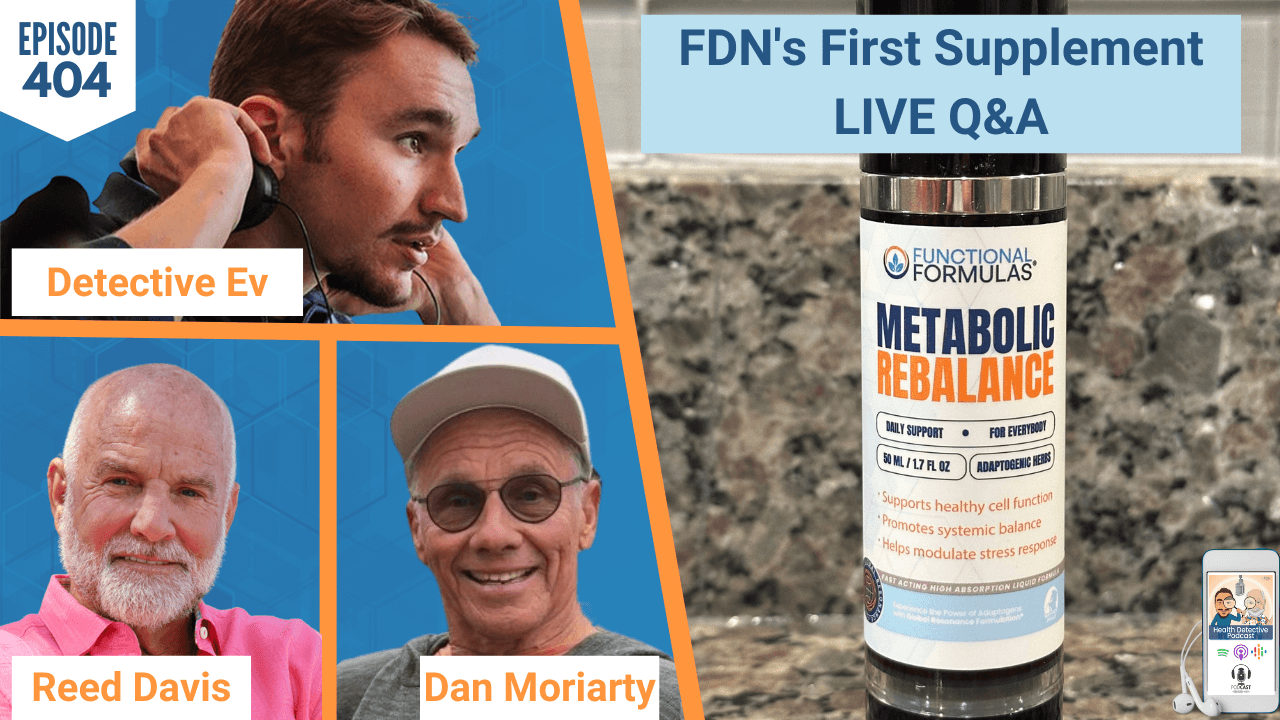Introduction
[00:00:00] Detective Ev: What is going on guys? Welcome back to another episode of the Health Detective Podcast by Functional Diagnostic Nutrition. My name is Evan Transue, AKA Detective Ev. I will be your host for today’s show. We got a pretty special guest on. Her name is Dr. Aumatma Simmons, and we’re talking all about beating infertility.
That’s really why I consider her such a special guest. First of all, she has an amazing energy. There’s something to be said about that. But we’ve never had someone come on and specifically address this topic. It’s amazing the ignorance I had going into this podcast. I’m like, we’re gonna run out of things to talk about. We’re on episode 100-something and we haven’t even touched on infertility specifically yet. There are just endless topics in the world of health. There’s always new science coming out and that’s what’s amazing. As long as you guys keep listening, we will keep producing content. We love talking to you guys.

What’s really interesting about this one is Dr. Aumatma’s philosophy on this. If you’re listening to the show, you completely recognize the fact that we are destroying our bodies with our modern world. We are not living in alignment with nature at all. Even in the world of the standard American or wherever you might be in the world in the Western society, we hear about people all the time having successful pregnancies at 40 or early 40s.
Challenging Society’s Take on Pregnancy
Now we do consider that late, of course, but we hear that all the time. So, if that is something that’s possible in our modern world with all the toxicity and all the crap that goes on, and the fact that it’s done by people who actually are not really necessarily living a lifestyle like we live at all. How far percentage wise, have we gone from nature? What would a true tribe be able to do? I think it’s an interesting question. I don’t think anyone in here, even if they could, wants to have a kid at 60, unless you’re trying to set the official Guinness World Record or something like that. I’m not sure what that age is. I think it’s actually over 60, which is kind of weird. But I don’t think you want to do that.

The point is, can we still have healthy pregnancies when we’re told we can’t or have it later in life, if maybe we wanted to live a different type of life for the first 35, 40 years. I think that’s the paradigm that Dr. Aumatma happily challenges. And I think the answer to that is, yes. We are talking about today, people who are told at the age of 28, that they’re too old to get pregnant and their body’s shutting down. That sounds like total BS. No one believes that. But they’re really having this objective experience where they can’t complete the pregnancy.
Amazing Gift – Beating Infertility
Well, Dr. Aumatma will tell you how we can deal with that. Then she’ll also share one of the most amazing stories at the end. I say amazing just in the sense that I’ve certainly never tried to have kids in my life, but I would imagine that this is a pretty profound experience for people, probably a deeply spiritual one.

When one cannot do this with their partner that they love and they want to do it, that’s probably a pretty challenging experience. Then to be given that gift when it was temporarily taken away, that has to be an amazing experience. That’s why I use that word.
What happened to this one couple is they were not able to get pregnant like forever. Then they start working with Dr. Aumatma, late thirties, the woman gets pregnant. They call her up in the early forties and tell her that they’re pregnant with another baby, both successful pregnancies. These are people couldn’t get pregnant. So, I don’t wanna say it’s never too late. If you’re 80 years old, it’s probably not gonna happen.
But this is certainly one of those cases in the world of health, where it can happen a lot later than you think. And I know that our audience, based on the demographic that we typically attract – all ages and ranges – I think this can be a really powerful message for people and super inspiring. Just making them realize that it’s not too late, usually for them. There are chances to get this under control.
Dr. Aumatma’s Background
So, a little bit about Dr. Aumatma. She is a double board-certified naturopathic doctor and endocrinologist. In practice for close to 15 years, she specializes in fertility and is the best-selling author of Fertility Secrets: What Your Doctor Didn’t Tell You About Baby Making and (In)Fertility: Struggles, Secrets, & Successes. Dr. Aumatma was awarded the best naturopathic doctor award locally in 2015 and 2020, and recognized as a top “Women in Medicine” doctor in 2020 and 2021.

In addition to supporting couples through individualized care in person and through long distance practice, Dr. Aumatma also trains practitioners who want to specialize in fertility. She has been featured as the holistic fertility expert on ABC, FOX, CBS, KTLA, MindBodyGreen, The Bump, etc., along with being interviewed for countless podcasts on the topics of fertility, pregnancy, and postpartum health. Well, you can tell this is gonna be a good episode. Let’s get to it without further ado. Here we go.
All right. Hello there, Dr. Aumatma, thanks so much for being here with us today.
[00:04:38] Dr. Aumatma Simmons: Thanks for having me, Evan.
[00:04:39] Detective Ev: I’m excited for this topic. I feel like this is something that comes up indirectly a lot, but we’ve never had one person in 120-something episodes that has come on here and talked about this directly.
Biologically Here to Procreate
The topic is going to be, I’m sure we’ll hit on many things, but around infertility. I said this to someone before and I didn’t mean it offensively, but I need to be aware more of how people not in the health space might take this stuff. I look at the fact that we have such large problems with infertility as literally the biggest sign that our world is just crazy right now with the health stuff.
I mean, I’m a spiritual person. I don’t know what anyone else’s beliefs are, but I believe we’re here for something more. But even with that belief, you still have to remember that biologically, let’s call it what it is, we’re here to, you know, do something with a partner and create something with that partner.

That’s fundamentally the point here from a biological perspective. And my point in mentioning that is if we have 20-something year old women, or 20-something year old men that can’t successfully complete that process, wouldn’t it bring to people’s minds that we must be doing something fundamentally wrong if they cannot successfully act out that biological function that we’re here for primarily?
With that said, I don’t wanna get too ahead of myself. I am excited about it. I wanna ask beforehand, because you’ve been doing this for quite some time. What got you into this? Was it health symptoms of your own? Because I know that’s the case for a lot of people. I’m curious if it was a health journey of your own that led you to this work.
A Personal Nine-Month Journey
[00:06:01] Dr. Aumatma Simmons: Actually, sort of. I had been a naturopathic doctor already at that point for five years. I had worked with hormones and all of the natural things that people come in for to naturopathic doctors, but never once had I seen a fertility patient. I couldn’t even tell you that someone had mistakenly gotten pregnant, but I was going through my own process.
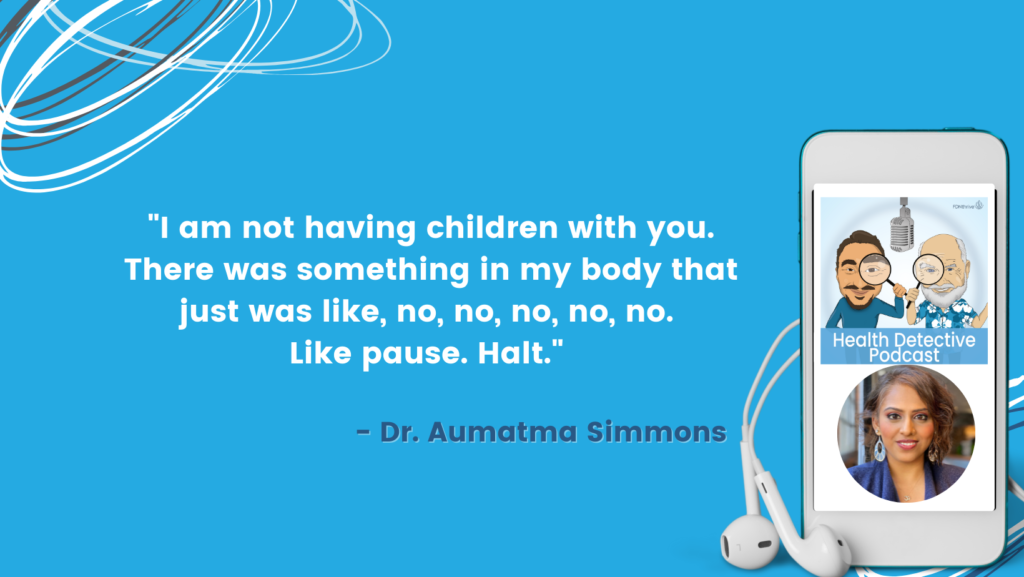
That process was being married to someone that wanted to start having children. That was the first moment that I had stopped to think about it. And I was like, absolutely not. Like, did I just marry the wrong person? Because absolutely F no. Like, I am not having children with you. There was something in my body that just was like, no, no, no, no, no. Like pause. Halt. We had only been married for a few months at that point. And I was like, what does this mean?
I just got married. I don’t understand why my body’s just revolting against this. I went on a nine-month journey, on a personal level to say why? Like what was happening within myself that made my body just be like, no thank you. Then B, if this was a legitimate “No, thank you” and I was gonna stick to that, what did that mean for the rest of my life? Was I never gonna have children? Was I okay with that?
Global Issue of Beating Infertility
I was really super early in my thirties. At that point, I hadn’t given it that much thought. It was like, yeah, one day maybe I’ll have kids. I had to get really clear within myself to be like, hey, if it’s taken me 10 years to actually say yes to marrying someone, and then all of a sudden, I’m like, no, I’m not having children with you, what does that actually mean? So, I did a lot of digging.
Even in naturopathic medical school I had learned that our fertility magically drops off of a cliff at 35. That was the belief that I had. Honestly, the few little things that I remembered from medical school were not super helpful in how was I gonna preserve my fertility till I was ready to have children with hopefully someone else. It was just a big journey of questions that I needed answers to.
In that process, in the nine-month journey, the more I discovered, the more research I dove into, the more I was like, holy crap, we have a massive issue. It’s global. It’s not in the U.S. alone. It’s everywhere across the world.
Fertility rates are dropping off of cliffs. The only answer that couples are getting is, oh, it’s your age. That major myth, I went on this rabbit hole of how did this start? Does our fertility actually drop off of a cliff? Cuz that seems weird. Like nothing in our body just suddenly stops working. It’s a process. So, does that just happen overnight? Like I’m gonna wake up at 35 and magically have no eggs? What is going on?
Infertility Myth
What I came up with was that myth is actually a myth. It got created in the 1800s in France, not out of scientific research at all, but out of churches that were noticing a drop off in women coming in to baptize their children after the age of 35.
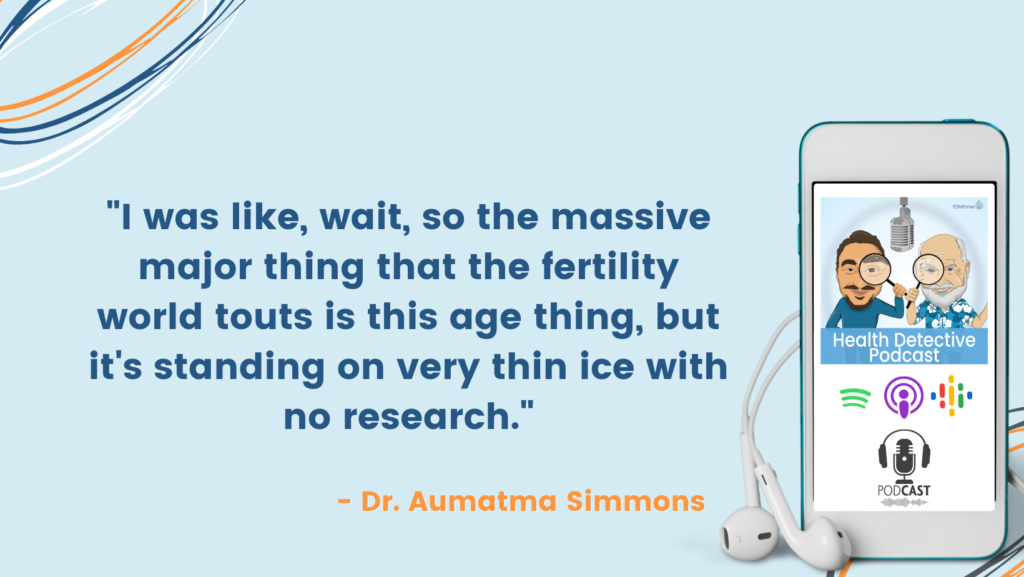
I was like, wait, so the massive major thing that the fertility world touts is this age thing, but it’s standing on very thin ice with no research. Even naturopathic medicine, why do we keep telling people this when there’s no scientific reality to it? And how do we transform it?
Honestly me specializing in this, it wasn’t planned. It wasn’t like, this is what I wanna do with the rest of my life. It was literally like, wait, we’re just lying to people. I just would start talking to women and they were like, oh my God, maybe you can help me with my fertility. I was like, no, that’s not what we’re doing here. But it became the default because 11 years ago, there really were not that many holistic practitioners doing fertility. And they definitely weren’t coming from this, if procreation is not happening, it’s a really clear sign and symptom of something deeper. It’s not like we need to manipulate your hormones to make it happen.
That is one belief that I very much believe like there is something else going on almost always. If we don’t know what that is, then we are literally masking all of the symptom to help your body get a result that just isn’t always necessary.
Figuring Out Why We’re Not Beating Infertility
[00:10:45] Detective Ev: There’s so many things here, but the last part of what you just said is exactly what I was getting at, right?
I mean this is just a fundamental part of being human. It’s one thing if we wanna start talking about two 60-year old’s, I can’t have a kid. Okay. Fine. Obviously, we cap out at some point. But I’m 26 and I see people in my age range that need to go to fertility clinics, who do all of the stuff.
Just to be so clear (I haven’t guessed correctly how people interpret this before and I don’t mean this in a way of condescension or rudeness at all), but guys just common sense. We have to think that is a fundamental reason that we’re here. So, if we can’t do that, it’s not that you’re bad or something’s wrong with you, we need to figure out why this is happening. Why can’t you perform this very fundamental thing, man, or woman, whatever, whoever’s the issue? Usually, I feel like it’s a little bit of both in today’s world. That like the sperms of low quality. I know that men in my age range have 50% less testosterone than our grandfathers. There’s a huge problem.
It’s just, it’s an absolute mess in a certain sense. Not even that this is relevant to the podcast per se, for a health podcast, but I just think that idea of what you kind of alluded to of like, all right, do I want kids? Like that’s okay. We’re allowed to choose not to have kids.
To Have or Not to Have Kids
I was someone who for a very long time had said just adamantly that was never something I wanted to do. This wasn’t being some stupid 21-year-old guy who was going out and trying to pick up a different girl at the bar every weekend. I never have done that. That was never my thing. It’s not for me. So, I was like mature in these other areas, but also pretty firm in that belief too. People just look at you like, oh, what’s wrong with you? Or how selfish is that?

I’m like, selfish? Isn’t it more selfish to just have a kid and then like, oh, I still want to go live a normal life? But I also wanna have the kid. I know this because I know how busy I am and how much I love my work. So, I’m not gonna put the effort into that when I know I’m not gonna leave that. I think that’s more selfish. I see a lot of people with kids or even pets and they can’t maintain either of them because they want the cake and eat it too.
I’ve since changed that philosophy a little bit. I have a wonderful person I’m dating. I told her straight up, cause we’re very blunt with each other. If she says, I don’t want kids, I’m not gonna argue with her at all and she knows that. But at the same time, it’s just not a make or break for me either.
I think we need to normalize that a little more. That it’s perfectly okay to not desire that. Is it coming from a health place of like I can’t, or I don’t want to?
Plan Ahead for the “Maybe’s”
[00:12:54] Dr. Aumatma Simmons: Absolutely. If anyone asked me in my twenties, I didn’t wanna have kids either. I am not one of those women that forever felt like, oh, once I have a child, I’ll feel differently. I absolutely love my work. I will say to anyone that asks; my business is my first baby. That is my child. That child is 15, 16 years old and I have no qualms about it. Like my almost four-year-old will forever be sharing his time with my first baby. So yeah. I think it’s okay.
I think it’s important just like you said, we do need to normalize this conversation of, do I even want this? Unfortunately, what I find with a lot of people is that they haven’t considered the question until they get into their late thirties, early forties and they’re like, oh crap. Actually, I kind of wanna have a child. Now the clock is ticking, and I’ve lived this lifestyle that hasn’t really promoted overall wellness and is definitely depleted my hormones to the point where it’s gonna be a little bit of a challenge to be able to conceive. So, I feel like it’s important to ask those questions and it’s important to plan for it, even if we’re not sure that we want it.
If it’s a maybe then we need to live a lifestyle that’s congruent with future fertility, just to have the option.
Overriding Natural Desires
[00:14:20] Detective Ev: I think that’s wonderfully said. Even if it’s a maybe, yes, we should be. It’s not necessarily simple guys. Especially in today worldwide, we gotta make sure that we’re healthy. If it’s an adamant no, it’s like, okay that’s clear.
Really random fact, but kind of just an interesting study that I had read one time, there’s a direct correlation between high IQ men and sexual exclusivity (not something I should say on a podcast, tongue tying myself), but like monogamy, you know, but it’s not true for women necessarily. But women with a higher IQ have a tendency to not want kids, but it’s not necessarily true for men.
I always thought that one was very interesting. I guess what it implies in a sense is that as we have higher and higher IQs or the prefrontal cortex gets more and more developed, what are we really doing? We’re overriding what would’ve been natural and you know, men have this desire to just go out and spread the seed, right? I guess, I mean, it’s procreation.
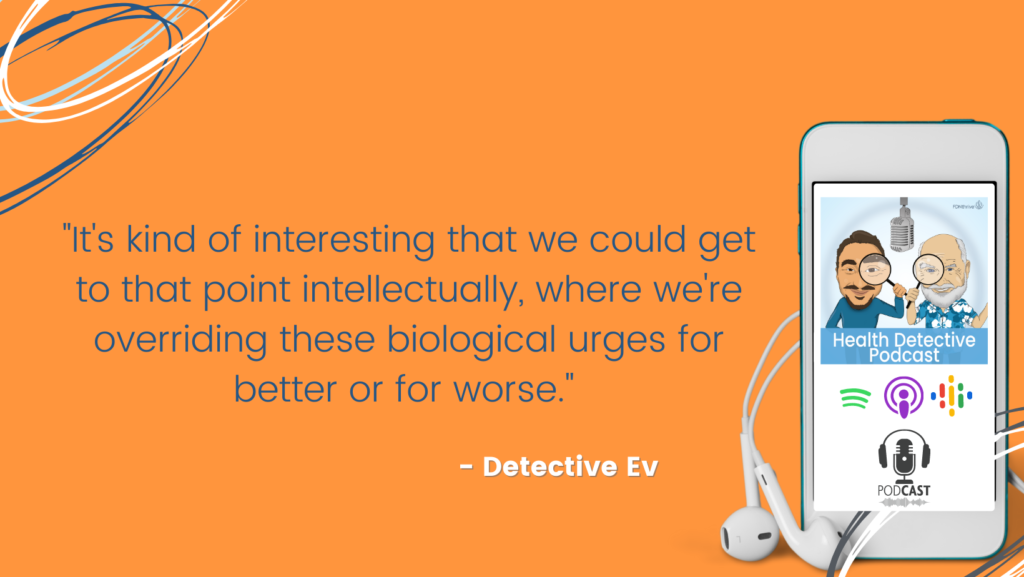
And women also have this desire to be those nurturing people that birth a child. It’s kind of interesting that we could get to that point intellectually, where we’re overriding these biological urges for better or for worse. It’s just an interesting thing that I read because I always hear bad things about it. with you. You might even be pretty smart.
Opening Possibilities is Beautiful
Don’t listen to a bunch of people saying that, oh, because you’re a woman you’re wrong if you don’t want kids. I think that’s absolutely insane. But I do think we need to actually sit with ourselves and know ourselves well enough to ask these questions. That, I don’t think enough people are doing on either side of the field.
When you got into this and you’re starting to focus on this a little more (It’s such a cool thing by the way, because when you do give this gift to someone that is not having success with the pregnancies and then you’re able to show them some of the stuff that allows ’em to do it, I would imagine, even as someone who maybe doesn’t have a preference towards kids, that must be the most beautiful and amazing thing in the world if a couple’s coming together and having that happen), what are some of the first things that you’re working on with people?
I mean, maybe it’s not one size fits all, I’m sure. Are there some fundamental things that we look at or prioritize in the testing or just consultations to figure out, all right, what are we doing in these areas? Because you’ve seen this to be problematic for a lot of people when it comes to getting pregnant.
Beating Infertility with Reveal & Remove
[00:16:17] Dr. Aumatma Simmons: I think our process is pretty similar with everyone.
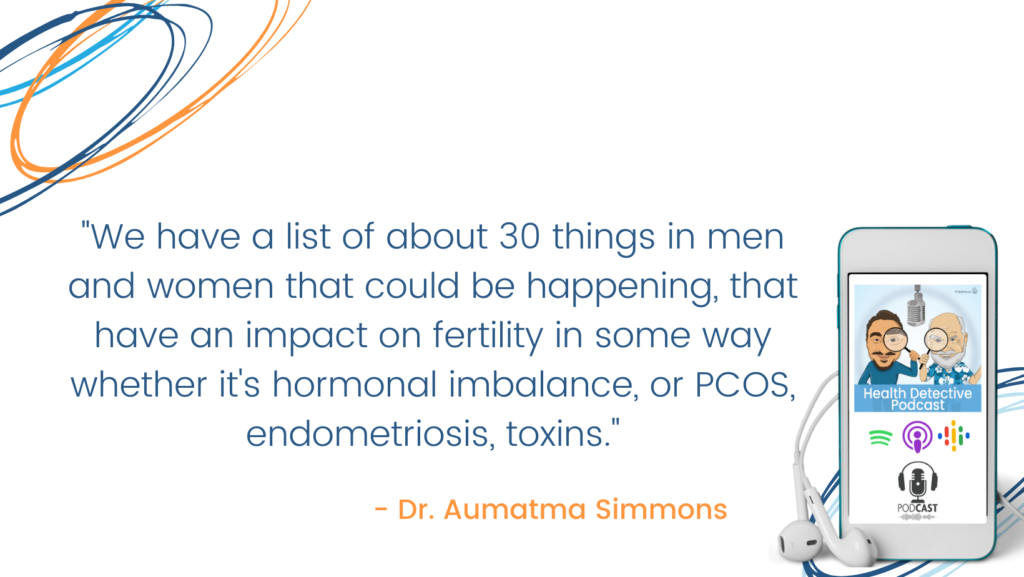
We have four steps. First step is Reveal. Our guiding principle is fertility struggle is a symptom of something else. It’s not a disease, right? So, if our assumption is that it’s a symptom, then we need to know what it is that’s going on that’s creating this symptom. So, that’s our first step – Reveal, figure out what is going on under the surface. We have a list of about 30 things in men and women that could be happening, that have an impact on fertility in some way whether it’s hormonal imbalance, or PCOS, endometriosis, toxins. There’s a whole host of things. So first we figure out what it is.
Then the second part is to Remove. Because there’s such an integral connection with modern fertility issues and the toxins in our environment that are playing a huge role, the second phase is always Remove. So, we get rid of toxins. We might say, hey, we need to purify our water. We need to get some air filters, whatever it is based on what that couple shows and demonstrates as part of their lifestyle.
Average woman walks out of the house or gets on zoom these days with 137 toxins applied to her body. I would venture to guess like 50 to 80% of those toxins are reproductive toxins. If we’re not changing how we’re living our lives, then it becomes really hard to work against it and try to do all of the other things. That’s the Remove Phase.
Beating Infertility with Rebalance & Received
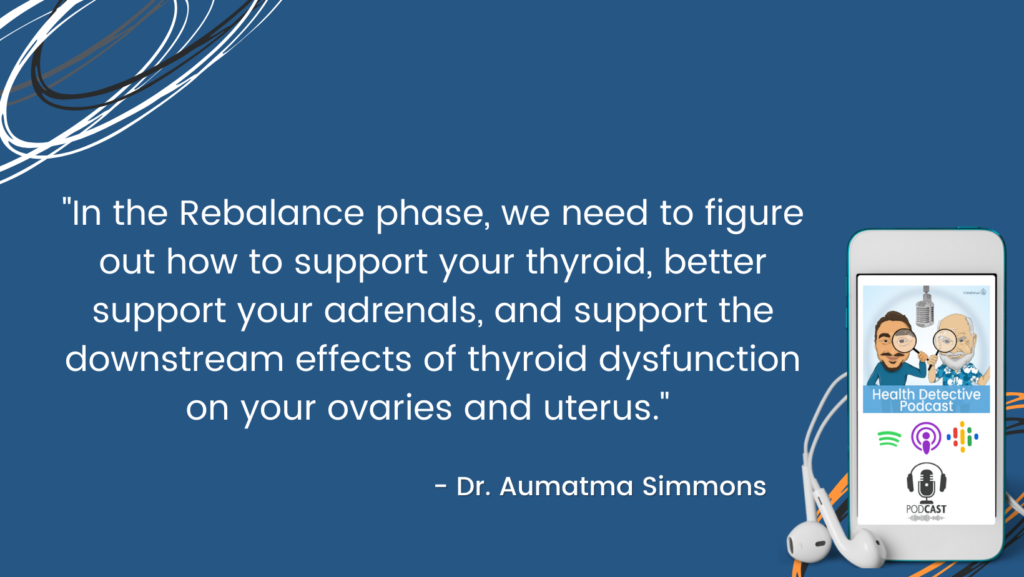
Then the Rebalance is really like in phase one, we figure it out. Hey, you have a subclinical hypothyroid issue. In the Rebalance Phase, we need to figure out how to support your thyroid, better support your adrenals, and support the downstream effects of thyroid dysfunction on your ovaries and uterus. So, really connecting the dots and saying this is what we figured out. This is how it relates to fertility. This is what we’re gonna do to rebalance it.
Then our last step is the Received Phase. I jokingly call it my woo-woo phase, which is essentially what I see over and over again. The women that we work with (and this is a small subset of people that are dealing with fertility issues), but over the majority of our people are high functioning, super Type A, super motivated women. The fallout of that is they’ve been predominantly in their masculine energy their entire lives.
So that energy is very much go, go, go, do, do, do, create, create, create, and that works. But fertility is at its core like a feminine thing. It’s the ability to receive, it’s the ability to open, it’s the ability to relax. If we can’t do that, if our body is stuck in a sympathetic mode – this masculine, whatever, however you wanna think about it, whatever resonates with you. If we can’t shift it to the relax, receive, feminine energy, then we are always gonna be working against ourselves. In our process, we really prioritize this shift to happen.
Beating Infertility with Transformation
Almost always I’ve said when a woman goes from like being super Type A, control, self-identified most of the time control freaks, and they shift and transform into being relaxed and trusting their bodies, trusting their cycles, there is a noticeable shift on my end. They will stop micromanaging everything that I’m doing and move into a place of like, oh cool. I can relax. I got trust. My body feels amazing. And I’m just like in it.
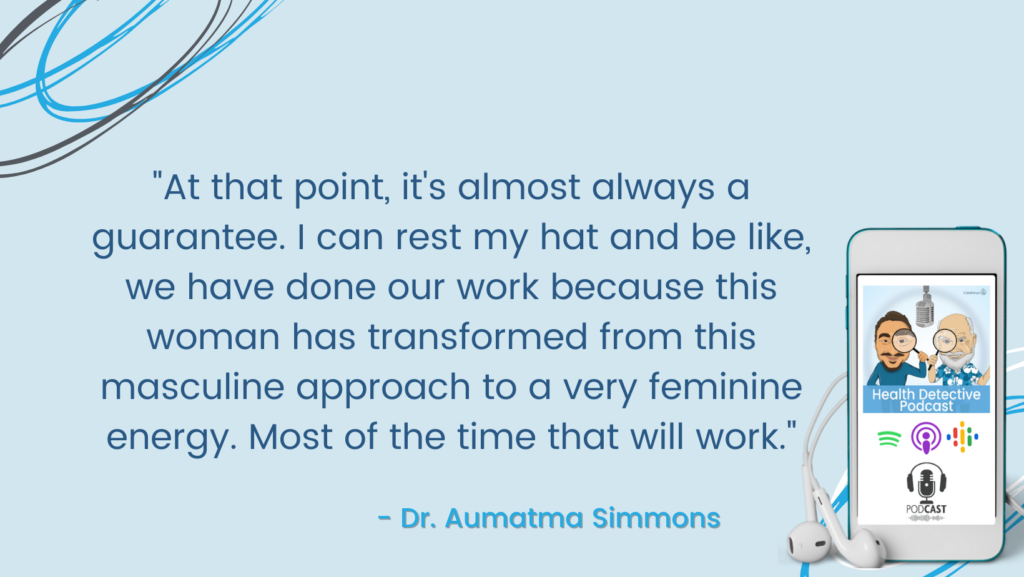
At that point, I stop questioning whether they’re gonna get pregnant or not. At that point, it’s almost always a guarantee. I can rest my hat and be like, we have done our work because this woman has transformed from this masculine approach to a very feminine energy. Most of the time that will work. That’s kind of the process and that’s kind of what we see.
We truly believe that if someone is dealing with fertility, it’s almost always, unless they’re a solo mom by choice, it’s a couple issue. It’s never the woman alone. We do this process with the female partner, as well as the male partner or in same sex relationships, the female and female. And ideally, if they know who this sperm donor is, then also the sperm donor.
The Energy is Real
[00:21:21] Detective Ev: Okay. I think the masculine and feminine energy here, by the way, just to be clear is very well received on this podcast. It’s kind of an odd thing, but it seems almost the more healthy you get, even if it’s very science based there is, I know this happened for me. I might be projecting, but I was like an atheist. This would’ve been so outta my wheelhouse, like 6, 7, 8 years ago. But as I got healthier, it’s almost as if I could just feel energy and I could become more aware of it and stuff like that. I think there’s so much validity to this.
It’s always the people that need it the most that reject it. Cause I would’ve rejected it completely. I like lived solely in the masculine; you know? And it’s cool, like you said, it does work, but there needs to be a balance. And there’s many reasons that we do that. I think our world, especially our capitalistic society just promotes that and so great, like go into it when you need to.
But yeah, especially for someone that’s trying to be a mom and host this baby for nine months, the body’s not going to allow us to do that if it perceives there’s this high stress environment that everything’s like cutthroat, all these things and like, why would it have a baby? We have such a long cycle of like, obviously this sperm needs to meet the egg and then we have this nine-month process, maybe even longer, depending on the person a little bit longer. This needs to be safe in you.
Beating Infertility in a Safe Healthy Place
The body is also pretty smart. So, it knows that it doesn’t just come out of the womb and it’s able to fight for itself. If I’m not mistaken, we’re one of the mammals with the longest time between birth versus our baby being able to go fend for itself. A four-year-old kid cannot do much in the wild. That’s a long time, multiple years. Compare that to two years of a black bear. Yeah. That thing’s gonna be doing pretty well by year or two, you know, it can kind of do its own thing.
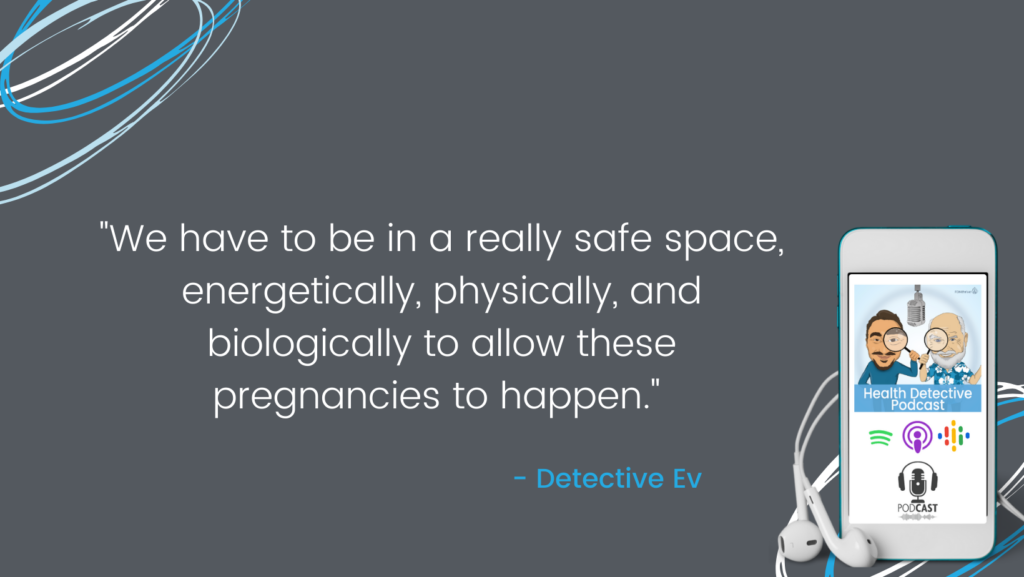
We have to be in a really safe space, energetically, physically, and biologically to allow these pregnancies to happen. I like that you said that it’s both partners. I think that’s absolutely true. I mean, if both of you are going to create it, you both gotta be on board with this. And I think there are a lot of things that men do terribly health wise, especially if they’re living in that masculine. We’ll just focus completely on providing or whatever we might be doing in our own minds or think we’re doing in our own minds. That’s at the sacrifice of our own health and our own bodies.
So similarly, guys, we have lower testosterone amounts, like we said. Our sperm is not of quality. It’s less and less in quality. We need to be honoring our own health, especially in those times that we’re getting pregnant. So, I love that you incorporate both people and I’m sure the husbands love getting involved with this too.
Beating Infertility by Getting Healthier
[00:23:38] Dr. Aumatma Simmons: You know, I feel like initially a lot of guys are resistant. They’re like, I don’t need this. My sperm work great.
Detective Ev: Mine are the best!
Dr. Aumatma Simmons: My swimmers don’t need help. Get outta here, doctor. But in reality, the way that I talk to men is very different. Their goal may not be better sperm. They may not even need better sperm, but almost always across the board, I’m like, well, could you see a benefit in improvement of your energy levels, your sleep, and your sex life? As soon as they hear the sex lives, they’re like, sign me up. Where do I sign up? But by the end of the program, the benefits they have received.
First of all, on this fertility journey, most of our clients have been through IVF. They have been down the roller coaster ride of stuff not working. For them to be like, oh my God, I didn’t even realize that I could feel better. I didn’t realize that 80% of what I was experiencing had nothing to do with the fact that I’m growing older, but like legitimate things going on under the surface that I would’ve never seen a doctor for.
Then to add to it, women’s pregnancy outcomes are gonna be dependent on a few different factors in the male partner. This happens again and again, all of our recurrent pregnancy loss couples will test the guys for all of the markers. And almost always, I would say 98% of the time, the male partner either has high blood sugar and insulin levels or high homocysteine levels. I saw this pattern for years.
Beating Infertility with the Man’s Health Too
Finally, there’s research to support that hyperhomocysteinemia and high blood sugar is going to have a direct impact on whether or not the woman is able to carry to term. And it has no impact on the sperm. So, the sperm look amazing, but there are these other things that no one has looked at, which happens always. I don’t know too many other doctors.
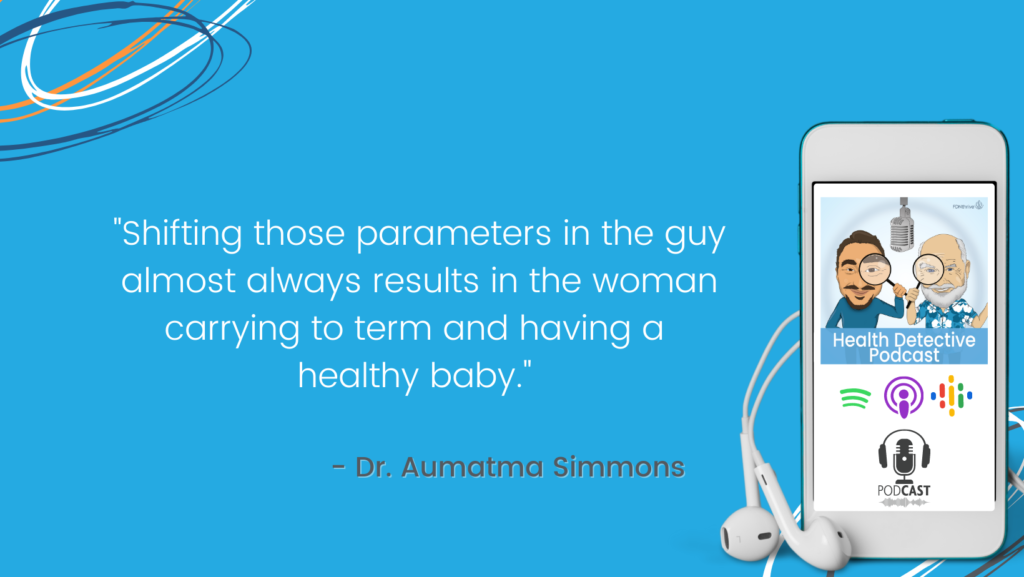
There is legitimate studies that we don’t know exactly why this is happening, but we do know that high homocysteine, high hemoglobin A1C, or high insulin, will almost always correlate with a woman who has had recurrent pregnancy loss. And shifting those parameters in the guy almost always results in the woman carrying to term and having a healthy baby.
So, this idea that we can leave the guys alone if they’re sperm are good is like so outdated. We need to think about the male partner is not just a sperm donor. He’s a live human being that has multiple things happening. What the guys tell me is I have never been seen as more than a sperm donor in this entire journey.
[00:26:47] Detective Ev: It’s so funny. It’s not funny. But when you word it like that, it’s like, yeah, my husband, my sperm donor. I’m sure they wouldn’t wanna be viewed as just that.
Your Body is Communicating
[00:26:53] Dr. Aumatma Simmons: Yeah. Part of it is like he wants to support, he wants to be part of the journey, he wants to be included. Most of the time he doesn’t realize that there’s just so much. All of our bodies are talking to us all the time. We’re not always listening. But our body’s like, oh, I have these joint pains. What’s going on? It must be that I’m getting old. Or, oh, I don’t have the energy I used to have. What’s going on? Oh, it must be me getting old. But it’s not always just getting old. It’s like other things are going on. And our body is trying to communicate like, hey, something is out of whack. Can you just like pay attention and look at it?
I would say 99.9% of our clients leave our program feeling amazing. Not all of them get pregnant, but a really high percentage do. Even more than that, it’s like their health is transformed and now they have the tools to continue that for the rest of their life. Now we’ve set up a family to be, to bring a child into a healthier environment and have that child start on a health journey, even before conception.
Transparency & Compliancy
[00:28:07] Detective Ev: I really appreciate the authenticity and just transparency. Hey, not everyone gets pregnant, but a lot of people do and 99% feel much better. That’s always worth it too.
Can I ask? Cause I feel like this would be a major thing that would go through the audience’s mind immediately. You clearly have done so much of this, even to figure out the correlations between the homocysteine levels. The blood sugar thing, most people could buy into that and just think of that common sense wise, but the homocysteine is a little more astute, right? Figuring out, wow, this seems to be high in these people that aren’t carrying to term. And then go figure, now there’s data for it. So that’s amazing.
What have you found are some major similarities between these people who not getting pregnant? Is it an age thing? Are they not compliant? Do you just not know? I mean, what’s the main reasons you think?
[00:28:49] Dr. Aumatma Simmons: Out of the couples in our practice that are not getting pregnant?
[00:28:52] Detective Ev: Yeah. You say some people don’t. So, like what do you think’s happening to them?
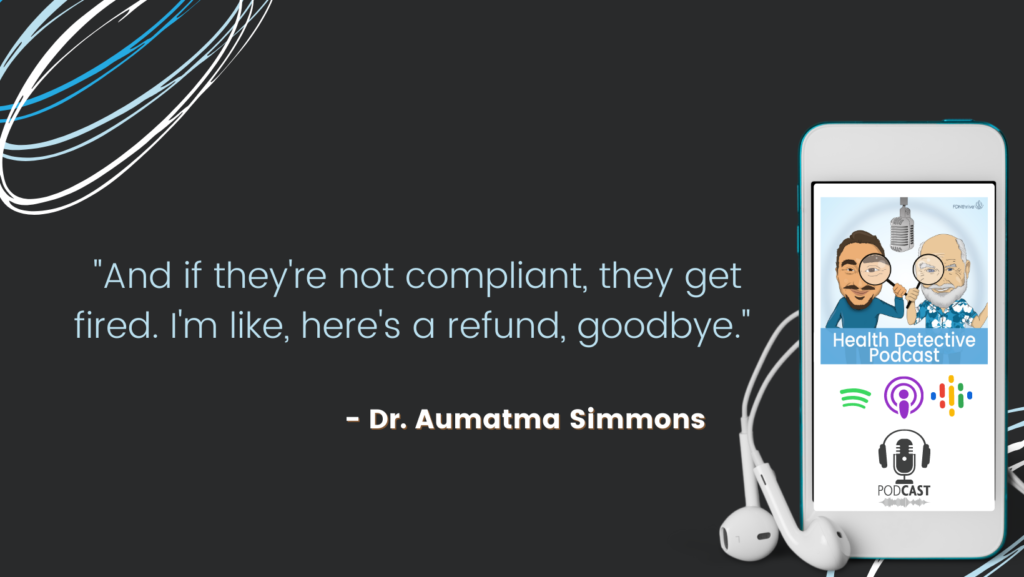
[00:28:56] Dr. Aumatma Simmons: Yeah, I will say, we have some amazingly compliant people. Right? I feel like our clientele is by far like incredible people. That I’ll give them. And if they’re not compliant, they get fired. I’m like, here’s a refund, goodbye. I don’t have time for BS because there are way too many people to help and you’re just taking up time on my calendar.
Detective Ev: Well said.
There are Those Challenges
Most of the time, if we’ve continued working with them, they are doing what we ask them to do. Unfortunately, what I’ve seen is after the age of 43, there’s greater challenges to conception. I will warn anyone that we’re working with. Like we have 45-year-olds that have had incredible results, but that is not the norm.
The norm is there is this shift that’s happening and still, I don’t wanna fully buy into the age philosophy cuz it’s too easy of an answer. But I think that there is like greater and greater challenges after a certain point. So maybe that’s part of it. The other part is their bodies are often not responding the way that we would expect.
Let’s say there’s a hormone imbalance. Someone has super high levels of estrogen compared to progesterone. They’re estrogen dominant. We’ve done all of the estrogen detox support that we can possibly do. We have made the tweaks; we’ve done the epigenetics. We’ve done layers and layers and layers of work on this. And still their body is high estrogen.
At some point we have to pause and say like, your body is kind of overpowering everything else in this way. And it may just be a natural process that your body’s ready to go into perimenopause. Perimenopause is a time when estrogen will naturally be off the charts.
It’s like, yes, we wanna do everything we can. And there is the limitations that the body has in and of itself. Then other times when people are not necessarily age over 43, I’ve had 33-year-olds who this process hasn’t worked for. And those break my heart because I’m like, what is it?
Why All the Hoops?
And for them, a lot of times they came to us just too late. Like they came to us in their Anti-Mullerian hormone, which is a marker for how many eggs there are in the ovaries. It’s a very rough estimate. There are 30-year-olds whose AMH was just 0.3, 0.2 when they started working with us. Then we go through the whole process and there’s always hope of like, oh, this is gonna reverse after we optimize all the other underlying stuff, but it doesn’t always happen.
They’re just born with what they’re born and there isn’t a lot that we can do to reverse it if in reality, their AMH is reflecting actually what’s happening for them in terms of how many eggs they have left. There’s just some challenges that can’t be overcome, but my job is to make sure that there’s really clear expectations from the beginning.
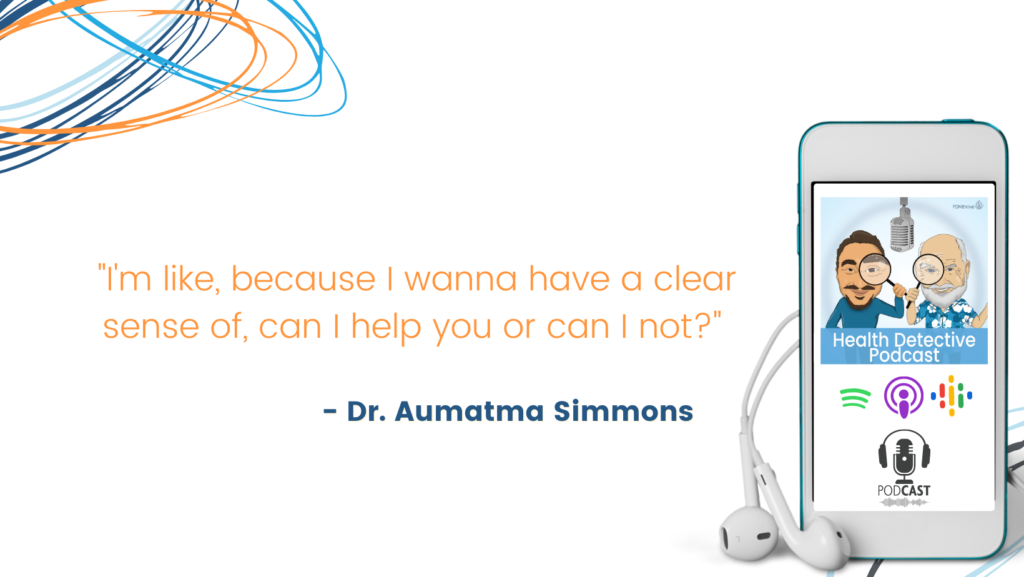
We analyze everyone’s hormones before they come work with us. Before you pay me anything, I wanna see what your hormones look like. A lot of people are like, why do you make me go through all these hoops to talk to you? I’m like, because I wanna have a clear sense of, can I help you or can I not?
If I can’t help you, there may be someone else better. Or this holistic, natural thing is just not for you. But if I can help you or if I could maybe help you, then I wanna tell you that it’s a maybe, and this is why it’s a maybe. Then you’re choosing whether or not I’m a good fit for you.
Beating Infertility with Transparency & Authenticity
[00:32:59] Detective Ev: Again, I gotta say the exact same thing that I said last time. I just love the transparency and authenticity. That was just such a great answer. I think it makes you that much more approachable to work with. You actually went outta your way to say, no, I do believe these people are being compliant. Like you could say, oh, they’re just not compliant. How would I ever know? you know what I mean? I think it’s just cool.
I think this is where we need to move with society. People are so done with the BS sales tactics and stuff like that. We come, we provide good value and that’s that. And that’s the philosophy too with FDN. I know that you know, Reed. There are some FDN fertility specialists out there, but it’s not like we’re ever technically focusing on one thing.
That’s what’s the beautiful thing is when the body is healthy, it does what it’s supposed to do. When the body is healthy, it does not have acne. It does not have psoriasis. It does not have extreme gut pain all the time. It can also get pregnant, assuming we’re of a reasonable age and you know, everything else is fair enough. Because again, I don’t think anyone’s arguing a 70-year-old woman, I mean, there has to be some limit here, obviously. We’re not arguing that 70-year-old women could secretly get pregnant. We don’t realize it. Although I do think it’s very creepy, there’s certain societal things I’m just really glad do exist because you know, men don’t have that problem.
Living Good Lives
Like a 75, 80-year-old man, in theory, can still get a 40-year-old woman pregnant. And it’s just very creepy to think like what our evolutionary things were supposed to be like. I don’t want a picture my grandpa with someone my mom’s age, that’s just so gross and just creepy and weird. So, I’m glad we’ve shifted away from that.
There is a limit, but that limit is so much farther than what we’ve seen. Again, I’m not in that space of the fertility thing. I study lot of things that are relevant to my own health. Obviously, I have that bias and that’s never come up. But it’s amazing.
We had a guest on here. It’s not that she focuses on fertility. She’s had a lot of people come to her for that reason just by default. Dr. Aumatma, it’s amazing. I mean, she’s constantly posting the direct testimonials from these people 40, 41, 42, 43, 44-years-old. Hey, I just got pregnant for the first time. And they have these healthy pregnancies. It’s like, wow, if that doesn’t shift your paradigm on what you think is true. Think about this too. These people were sick, got better, and then had a healthy pregnancy at 44.
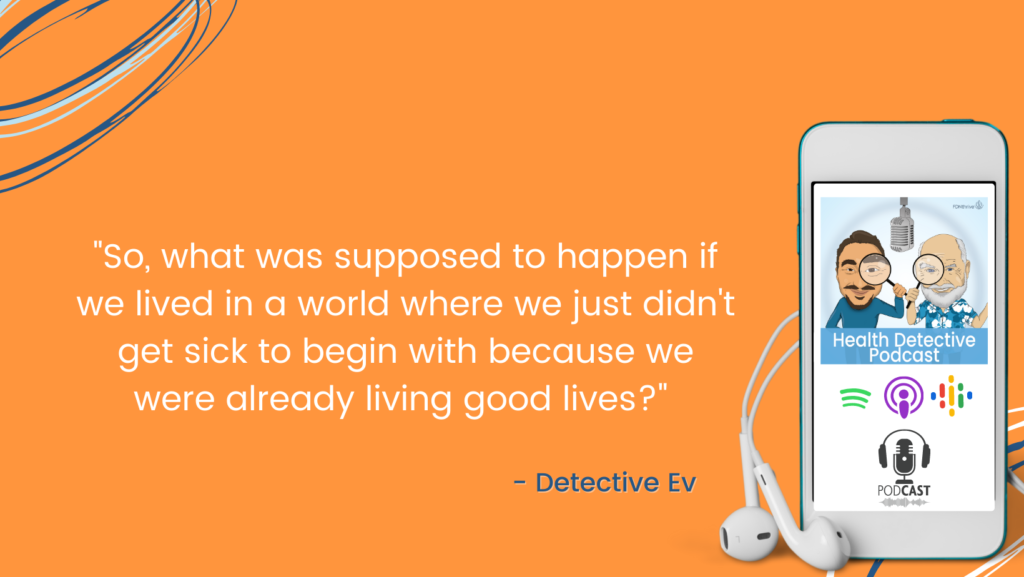
So, what was supposed to happen if we lived in a world where we just didn’t get sick to begin with because we were already living good lives? I mean, I don’t know what the limits on this would be.
I’m not putting you on the spot here, I’m not attempting to. Let’s say perfect world, right? What is the age that most women shouldn’t be getting pregnant? I mean, should women be able to get pregnant at 50? Like what do you believe about this?
We Have Some Reframing to Do
[00:35:16] Dr. Aumatma Simmons: Well, yeah, so I don’t totally know if I have enough evidence to support what I’m gonna say. But I have very respected leaders in the field of women’s health who like one of my favorite people is Dr. Christian Northrop. And I know she’s kind of like a hot button right now, but there’s a book that she has called Women’s Bodies, Women’s Wisdom. It’s like the Bible on women’s health.
It was initially her reading her approach to fertility, where in her book she talks about women in other parts of the world that live in these remote cultures that don’t have access to toxins and telephones. They’re like really, really, really remote and they’re living these amazing lives in tune with nature, in tune with doing all the things. They have such a different experience.
She mentions in the book that these women are having healthy pregnancies and healthy babies on average in their societies at the age of 60. That was the first moment where I was like, what if everything that I know and have been taught is only applicable because we live these toxic lives? It really expands the view of what’s possible for humanity, right? They live to 130, 140 then sure, have a baby at 60. Why not?
Not that I would wanna have a baby at 60, but I feel like if it’s possible, if humanity is able to do this, then do we have some reframing to do of why we think that suddenly at 35 people can’t have children. And they’re getting younger and younger.
Bringing Light to Early Ovarian Aging
It’s kind of scary how many pre-35-year-olds, 32, 28, are being told they’re too old and their ovaries are too old, and their eggs are too old. I’m like, we have to stop this. Like what is going on that doctors think it’s reasonable to tell a 28-year-old that her eggs are too old? And based on what? Just based on the mere fact that she’s 28 in biological years?
There’s no test. There’s literally no way to assess egg quality unless you have been through an IVF cycle. So, unless you’ve been through one cycle, there’s really no way to say, hey, egg quality is your issue, or age is your issue.
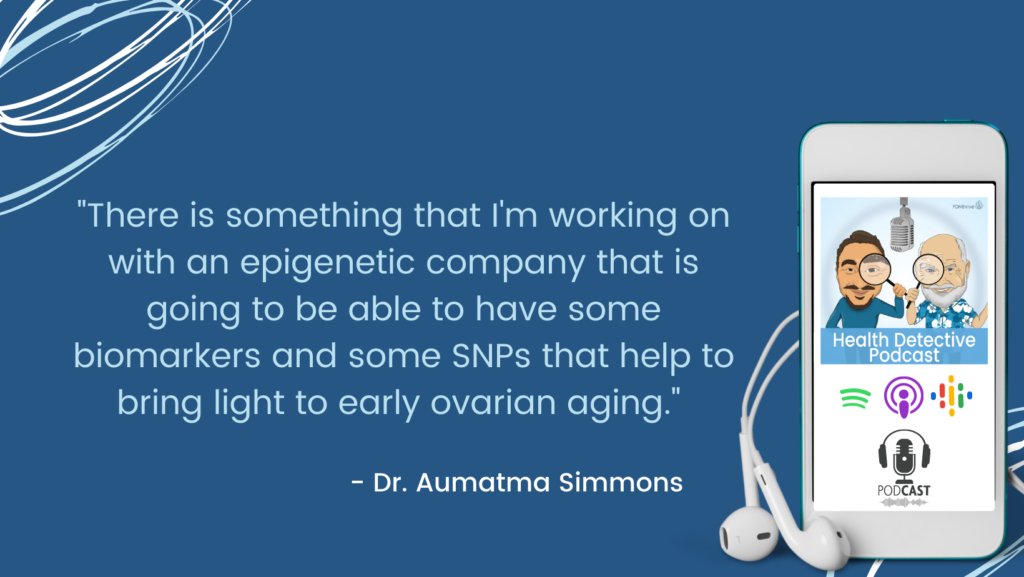
It’s coming. The testing is coming. There is something that I’m working on with an epigenetic company that is going to be able to have some biomarkers and some SNPs that help to bring light to early ovarian aging. And if we can say like, oh actually your ovaries did age early, then sure. Let’s have the age excuse.
But if we can’t, then let’s not tell 28-year-olds that they’re too old to have children. By the time they’re 35, they’re being told, why did you wait so long? And what’s wrong with you? I just, I truly believe that we as women and honestly, men are in that same struggle of being married to someone who chose to wait till later, or they themselves were hoping to wait till later to have children and family, postponing family creation. That’s okay. Like, I feel like we should be able to choose when it is that we have children, if ever.
Waiting Later, While Getting Unhealthier
And to have our team of medical providers really supporting our vision and creation of a life rather than them judging us for what we chose when we were younger. You have all this judgment towards me because I chose to go to medical school. Like, no, get outta here. Goodbye.
[00:39:26] Detective Ev: What a great set of points. We’re really in the dilemma if this was true, because we have a society now that is leaning towards having kids later because we have so much. We’re going to college; we’re doing all these things. We gotta save up. The economy’s tough.
But then at the same time, we’re becoming unhealthier. So, the window for certain people, if they never got their health under control, would’ve been less. That’s just not gonna work. I mean, that’s just simply not going to work. We need to just completely reframe this and share the truth. I love that.
I had no idea what you were gonna say age-wise honestly, with those. I could tell what you were getting at when you were bringing up that tribe or those people that maybe are just not connected to the Western world. I didn’t think you were gonna say 60. That even blew my mind, you know. I do believe it.
I don’t think sometimes people, even in our natural or functional space really are thinking about how far away we are from what we should be doing as humans. You and I are into health. We’re on computers right now, staring at screens indoors. That’s not what humans do. It’s sunny outside. I’m supposed to be outside feeling the cold and having my skin and body respond to that cold stimulus because this is where I live.
What Are the Possibilities of the Human Body?
Not only can I not do that, I would probably die if I slept outside tonight because my body just cannot handle that anymore. I do like the cold plunges and stuff. I work on it, but it’s just so funny. The native Americans lived in this area. They survived these winters. I’m in March and I would probably die if I slept outside tonight. That’s a problem.
We’re doing many things so wrong that how do we even know what normal is? How many people do we know that walk around without at least one symptom? Again, I’m super into this stuff. And yes, I might have been a little disadvantaged. I started out sick pretty young and no one really knew what was going on, but it doesn’t take much stress for me to get a breakout or for me to feel overly tired. It’s very little.
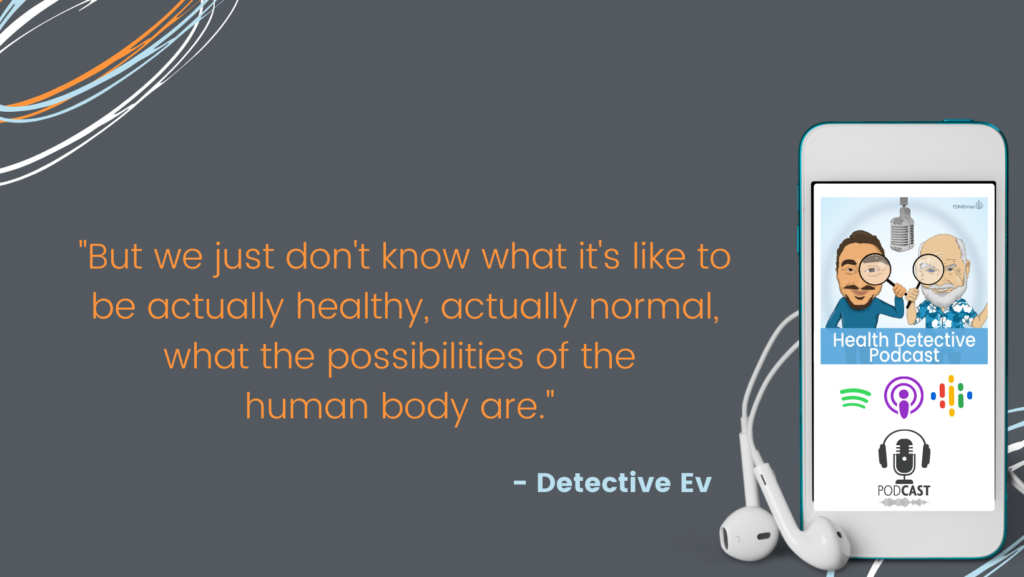
So, I’m always walking this kind of fine line. I seem to be trending better as time goes on, which is amazing that I could still be doing that. I find that great, especially as I’m getting older. But we just don’t know what it’s like to be actually healthy, actually normal, what the possibilities of the human body are.
Again, even as someone who maybe doesn’t resonate with a huge desire to have kids, I can still fully understand how beautiful it must be to hear these types of messages. Obviously, you’re just being real. It’s like, hey, this is an actual thing. You need to stop listening to these people that are telling you yeah, 28, you know, you’re too old to get pregnant.
We Gotta Figure Out the Other Stuff
That’s what I was referring to. I’m having people from like high school call me up cuz they know I’m the functional guy. They’ll just ask if I know anyone that even does that. I’m like, I don’t know that much about that topic. But I’ll tell you this, you’re 28, you can get pregnant. Like we just gotta figure out some other stuff. I very highly doubt that your body cannot get pregnant at some point with the right stuff.
Obviously, this conversation been going pretty fast. I’ve been enjoying it. I wanna make sure that we ask a few other things though, especially of where people can find you. But with someone like you in particular, I wanna make sure we touch on client successes. Not only because of the topic, but just because of how long you’ve been doing this.
Are there any particular stories that you’re able to share? I’m looking for something maybe along the lines of where someone had tried literally everything and then they come to someone like you and their paradigms just shifted, then they are finally able to get pregnant.
Does anything stick out?
You’re Our Last Hope
[00:42:23] Dr. Aumatma Simmons: Yeah. Gosh, so many stories. These are some of my favorite clients. They had three miscarriages, been to several different IVF doctors who all actually said, sorry, this is never gonna work for you. You need an egg donor and she’s 38. He’s like 40 or 41, something like that.
This is one of my literal, what we were talking about earlier. His sperm actually looked amazing. Most of the time I’ll be like, I wanna see the results, cuz I don’t always agree with the conventional paradigm where they say everyone’s sperm is great, but it’s always the woman, right? Like the usual stuff.
But for him, I looked at his results and was like, actually his sperm are pretty good. So, let’s do the other testing. Sure enough, hypohomocysteinemia and pre-diabetic. On the female side, she had extremely high estrogen levels and really low progesterone.
For me, that’s the best-case scenario. I’m like, oh, there’s so much to do. And once we do it, you’re gonna have amazing results. But her AMH was 0.3. Which if your AMH is below one, the stats are not that you’ll never get pregnant, but an AMH below one is pretty consistent to poor IVF outcomes.
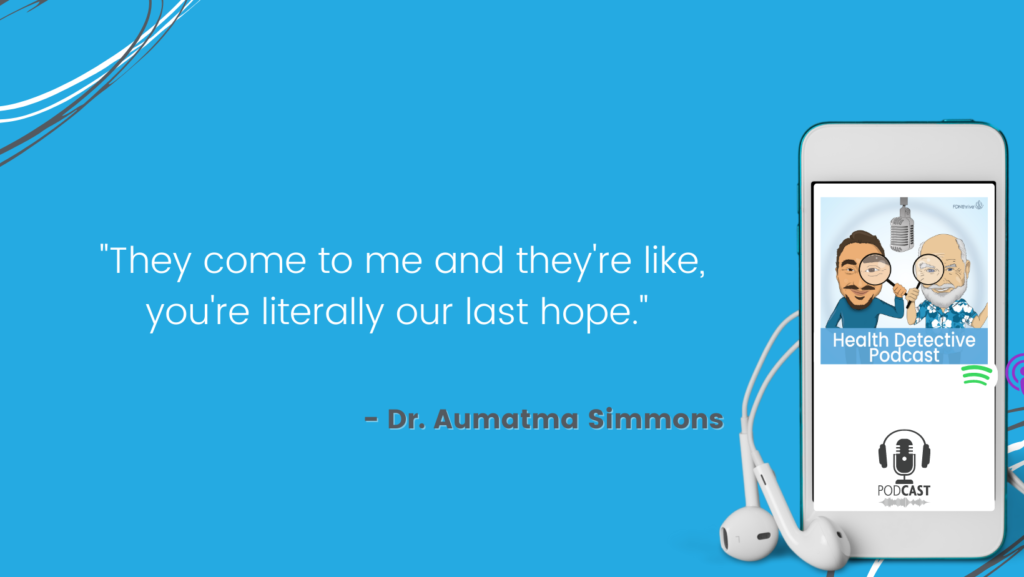
It has nothing to do with whether or not you can get pregnant. It’s literally how well will you do with IVF? And most of the time, if AMH is low, that means you probably aren’t a great candidate for IVF. That’s why she had been rejected by multiple IVF clinics. They come to me and they’re like, you’re literally our last hope.
Beating Infertility – A Totally Amazing Pregnancy
We don’t even know how we found you, but we’re really glad we’re here. Whatever you tell us to do, we will do. This couple massively transformed their life. He lost like 40 pounds. He’s essentially an Uber driver. So, he spends most of his day, 12 to 14 hours a day, sitting in a car, driving people around.
I was like, we’re gonna have to integrate some sort of movement cuz sitting there all day is not helping your fertility. And then on her side, we needed all the estrogen detox optimizing and quality, optimizing progesterone, just a lot of different things we had to work through.
Simultaneously, we lowered his blood sugar, lowered his homocysteine, and six months maybe seven months later they were pregnant. The story doesn’t end. They had this amazing pregnancy. The whole time she was like, every time I’ve been pregnant, the baby’s like kicking me in the guts and it hurt. The way she described this, I was like, oh my God. That is not a normal pregnancy experience at all.
So, the whole time she kept messaging me. Like, I don’t have any symptoms yet. I don’t have any symptoms yet. I don’t have any symptoms yet. And the whole time I was just like, don’t worry. We’re doing all the testing, everything looks good, everything looks normal. She could not believe that she had a pregnancy without zero symptoms, no nausea, no pain, no back pain. She went through the entire pregnancy, like a champ. She turned 40 by the time she had the baby.
Beating Infertility – The Impossible Impossibility
She has the baby. Literally on the first birthday, they’re having the baby’s first birthday party and she’s texting me like, Hey doc, baby’s one today. I was like, yay, congratulations. She was like, no, we’re ready for baby number two. I was like, oh, wow! That was not in the works. I had no idea. I was like, okay, well, go back on your plan. I know you guys have continued doing everything so just follow the plan. Literally two cycles later, she messaged me and was like, we’re pregnant!
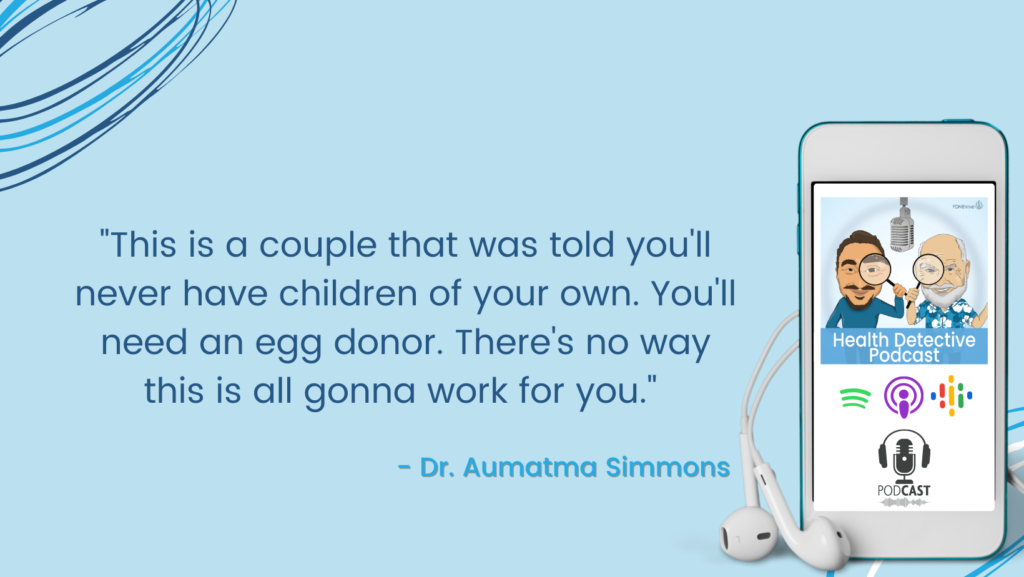
She went on and had a healthy baby, healthy pregnancy, all the things. This is a couple that was told you’ll never have children of your own. You’ll need an egg donor. There’s no way this is all gonna work for you.
And to get pregnant on their own and continue having loss after loss is like, that’s hard. That’s a really rough life. That couple is always at the top of my list because they had just been through so much by the time they came to see me. They’re like the poster children for my program because I’m like, yeah, this is gonna work. Of course it’s gonna work.
[00:46:42] Detective Ev: That’s wonderful. I think they’re especially relevant as like a good example because they are in the conventional sense, older, right? It’s not like the 28-year-old woman and a 30-year-old man where we’re like, everyone can. Even average people question that, like what? I really can’t get pregnant at 28, you know? I found that to be the case at least. But no, with that age, they might really think, wow. Yeah, no, this is just it. I can’t do this.
Higher Homocysteine Correlates with Heart Issues
You said three miscarriages, correct? Then for two pregnancies, at an older age, back-to-back. It’s like, gimme a break. It just goes to show what can happen when the human body is healthy. And how cool is that, that you figured out that he had this stuff going on?
I’ve never heard the thing. Well, I would’ve just used common sense to assume that the high blood sugar wasn’t helping. I wouldn’t have known that directly affects it, but I mean, yeah, that just makes sense. What does it help? I did not know the thing about the homocysteine at all. I think that’s a huge, just really cool fact and something to look out for, for people on the podcast.
For those that don’t know, higher homocysteine is also correlated with heart issues. And you won’t usually get tested for that unless you have a history of the family heart disease or nothing else has worked.
Even for myself, about two years ago, I did a huge blood panel. I wanted to check everything right. It was probably $200, $300 or something. I checked like 50 markers and my homocysteine was not high, high, but it was up there. It was like a 12. I thought I was doing all the right things and just for a health perspective, like a heart type of thing, I knew I needed to kind of work on that. Go figure, like I have methylation issues. I could benefit from certain methyl folate and things like that. But I digress.
What an amazing story. Of all the health things that we hear, there’s beautiful stuff on this podcast. There’s people overcoming cancer. One of our more recent episodes with Freddie Kimmel just came out.
Traumatic Memories & Fight or Flight Hormones
Again, I can only imagine how good it feels when you’ve been through this – three miscarriages. Yeah. That’s like traumatic for people. I’ve seen that happen to people and it screws them up. But then to have two pregnancies after that, I feel like, I don’t know if it makes up for it, but certainly it’s gotta do something amazing for the body and soul when that kind of thing happens.
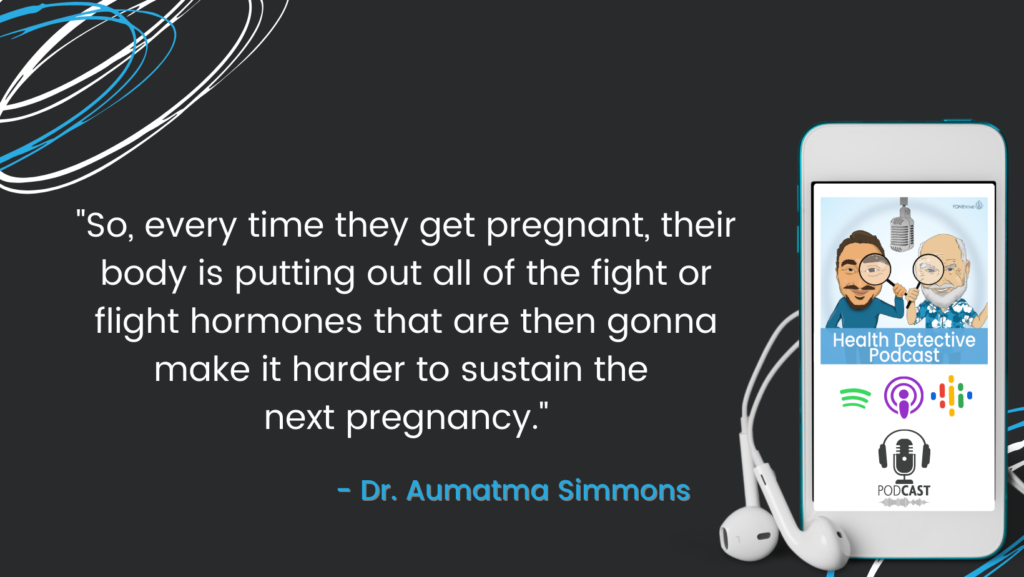
[00:48:31] Dr. Aumatma Simmons: Sorry, if I can just add, like, I kind of didn’t address it, but when someone has had a pregnancy loss, after loss, after loss, their body is holding onto the memory. So, every time they get pregnant, their body is putting out all of the fight or flight hormones that are then gonna make it harder to sustain the next pregnancy.
From the woo-woo side, kind of still scientific, it’s like you have to retrain the body to not have that same response. The fact that this woman had literally, the way she described her pregnancies, I was like, oh my God. Like your body is literally fighting to not be pregnant. Maybe that was true the first time, but I was like the second and third time might have had something to do with how intense your first experience was.
So just another thing to remember is what is our bodies doing? And if we’re in this fight or flight state, it makes it really hard to wanna create life.
[00:49:34] Detective Ev: Yeah. From the body’s perspective, why would I take nine months and put this baby in a vulnerable state when I know that I need to protect this thing? If there’s something attacking me, why would I do that? It’s doing the right thing.
Where to Find Dr. Aumatma
Now, with that said, Dr. Aumatma where can people find you? I know you got the books. I believe you have a podcast of your own. I think all this stuff. So please shout out all of it where people can find it.

[00:50:06] Dr. Aumatma Simmons: Fair enough. Our podcast is Egg Meets Sperm and you can find that on Spotify and Apple and wherever you like to listen to podcasts. My Instagram, I’m pretty active on. So that is holistic_fertility_expert on Instagram.
And then our website is holisticfertilityinstitute.com.
Signature Question – Magic Wand
[00:50:27] Detective Ev: Now, I wanna finish up with our signature question on the Health Detective Podcast, and it’s a simple one, but it’s loaded too for us functional people. The question is, if in this case I could give Dr. Aumatma a magic wand and you could get every single person in this world to do one thing for their health, whether that’s get them to do one thing or stop doing one thing, what is the one thing you’d get them to do?
[00:50:52] Dr. Aumatma Simmons: Yeah. I think it would have to be really good, high-quality sleep, every single night, and optimized for them. Not everyone needs to sleep eight hours or nine hours, but there are different body types that need different amounts of sleep. Then really making sure that that sleep we are getting is super high quality. That we wake up feeling rested, rejuvenated, and revitalized to go on with our day.
[00:51:20] Detective Ev: All of that to be told we need to sleep. Huh? Guys, when the body, in terms of pregnancy and really all disease, but definitely in terms of pregnancy, when it’s under constant stress and it doesn’t get that break that sleep provides to get into the parasympathetic state to relax, to actually rest, it’s not going to get pregnant.
It’s being told that there’s all these things going on and that this is a terrible time to have this pregnancy. Why would we bring this baby into the world when the host is in danger? We need to figure out ways to reduce that stress response. And certainly, we need to be resting and repairing at night. Sleeps the ultimate way to do that.
Break Down then Repair with Sleep
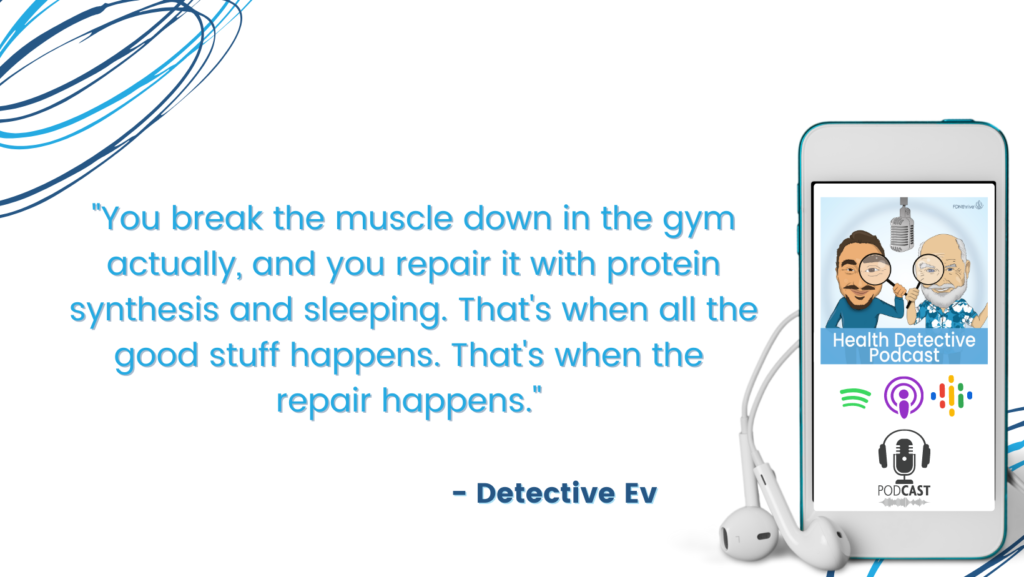
People don’t always talk about this, but it’s simple. You don’t build muscle in the gym. You break the muscle down in the gym actually, and you repair it with protein synthesis and sleeping. That’s when all the good stuff happens. That’s when the repair happens. We can damage the heck out of ourselves during the day and sleep was made to help kind of get that back on track. But if we’re not getting the proper sleep, and if we’re telling our body constantly that there’s all these stressors going on in the outside world, yeah, that’s not really gonna work so well.
So, thank you so much to Dr. Aumatma for coming on here and just sharing something that really no one has shared before on this podcast. I would even go as far as to say, I don’t think I’ve ever heard that whole 60-year-old pregnancy thing. That really challenges my paradigm. I’m curious and interested about that book. So, I will probably be reading that and adding it to my very large library of functional medicine type of things.
But we wanna thank you so much for listening to another episode of the Health Detective Podcast by Functional Diagnostic Nutrition.
Conclusion
If you’re someone out there who is interested in doing this work and wants to be able to provide people with these amazing experiences of actually being able to change people’s lives and perhaps even help them get that stress under control so that they can have a healthy pregnancy and live a good life, then visit FDNtraining.com.
You can book a free call there, and you can talk to one of our course advisors. They’ll be able to walk you through whether or not the course is for you or not. If this is something that you actually should pursue, do you have time for it? Go check us out. And hopefully it is for you. We’d love to add you onto our tribe, and I’d absolutely love to get you on the podcast
eventually, once you are graduated. We’re looking forward to talking you guys again soon, but until then, take care. Thanks for listening.




